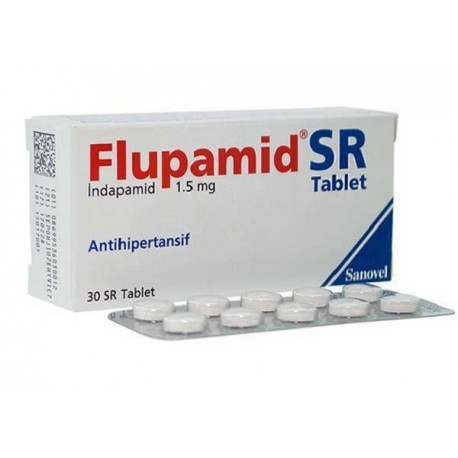 View larger
View larger Flumapid (Generic Lozol) Indapamide Tablets
New product
BUY MORE PAY LESS
| Quantity | Discount | |
|---|---|---|
| 2 | 5% | |
| 3 | 10% | |
| 4 | 15% | |
| 5 | 20% |
Volume discounts
| Quantity | Discount | You Save |
|---|---|---|
| 2 | 5% | Up to $3.20 |
| 3 | 10% | Up to $9.60 |
| 4 | 15% | Up to $19.20 |
| 5 | 20% | Up to $32.00 |
More info
FLUPAMID (Generic Lozol) tablet is taken orally.
*
Active ingredient
indapamide.
Excipients
It contains lactose monohydrate, polyvinylpyrrolidone K-30, hydroxypropyl methylcellulose, colloidal silicon dioxide, magnesium stearate, titanium dioxide (E 171), polyethylene glycol and glycerin.
1. What is FLUPAMID (Generic Lozol) and what is it used for?
FLUPAMID (Generic Lozol) SR tablet is available in round, white, continuous release blister packs of 30 and 90 tablets. FLUPAMID (Generic Lozol) has been prescribed by your doctor for the treatment of essential hypertension. It is a drug for lowering high blood pressure (hypertension) and contains the active substance "indapamide". “Indapamide” is a diuretic. Many diuretics increase the amount of urine formed in the kidneys. However, Indapamide is a little different. Because it increases the amount of urine formed in the kidneys very little.
2. How to use FLUPAMID (Generic Lozol)?
Instructions for proper use and dose/frequency of administration
The recommended dose of FLUPAMID (Generic Lozol) is one tablet in the morning. Due to its diuretic effect
It is recommended to take FLUPAMID (Generic Lozol) in the morning so that your night's sleep is not interrupted.
Application route and method
FLUPAMID (Generic Lozol) is taken by mouth.
Swallow the tablet with a sufficient amount of water without chewing or breaking it.
Use in the elderly
Elderly patients may be treated with FLUPAMID (Generic Lozol) if their kidney function is normal or only slightly impaired.
Use in children
FLUPAMID (Generic Lozol) is not recommended for use by children and adolescents.
Special use cases
Kidney failure:
Treatment is contraindicated in patients with severe renal impairment.
Liver failure:
Treatment is contraindicated in patients with severe hepatic impairment.
Unless your doctor recommends otherwise follow these instructions.
If you have the impression that the effect of FLUPAMID (Generic Lozol) is too strong or too weak, talk to your doctor or pharmacist.
If you use more FLUPAMID (Generic Lozol) than you should
If you have used more than you should use from FLUPAMID (Generic Lozol), talk to a doctor or pharmacist.
Effects such as nausea, vomiting, low blood pressure, cramps, dizziness, drowsiness, confusion, and changes in the amount of urine produced by the kidneys may occur when taken in large quantities.
3. What are the possible side effects?
Like all medicines, there may be side effects in people who are sensitive to the substances in the content of FLUPAMID (Generic Lozol).
Side effects are listed as shown in the following categories:
Very common: may occur in at least 1 in 10 patients.
Common: less than 1 in 10 patients, but more than 1 in 100 patients.
Uncommon: Less than 1 in 100 patients, but more than 1 in 1000 patients. Rare: less than 1 in 1,000 patients.
Very rare: less than 1 in 10,000 patients.
Diseases of the blood and lymphatic system:
Very rare:
- Changes in blood cells such as thrombocytopenia (easily bruising of the skin and nosebleeds),
- Leukopenia (decrease in white blood cells - unexplained fever, sore throat and other flu symptoms),
- Anemia (anemia),
Nervous system diseases:
Rare: dizziness, headache, fatigue and paresthesia (numbness or tingling in the hands and feet).
Cardiac diseases:
Very rare: irregular heartbeat, low blood pressure.
Gastrointestinal diseases:
Uncommon: vomiting
Rare: Nausea, constipation, dry mouth
Very rare: Pancreatitis (inflammation of the pancreas - resulting in pain in the upper abdomen). Hepato-biliary diseases:
Very rare: impaired liver function. In the presence of hepatic failure, the onset of hepatic encephalopathy may occur (impaired brain function due to liver failure).
Kidney and urinary diseases:
Very rare: renal failure.
Skin and subcutaneous tissue diseases:
Uncommon: Skin allergic manifestations, skin rash. Purpura (small red dots on the skin) in people with previous signs of an allergic or asthmatic reaction.
Very rare:
- Angioedema and/or urticaria, severe skin reactions. Swelling of the face, lips, mouth, tongue or throat that may make it difficult to swallow or breathe, severe itching or severe skin rash. In such cases, contact your doctor immediately.
- This may be worse if you have a collagen vascular (connective tissue disorder) condition such as systemic lupus erythematosus or scleroderma.
- Sensitivity to sun or UVA rays.
Laboratory parameters:
Changes in laboratory parameters (blood tests) may occur. In this case, your doctor may order blood tests. Changes can be seen in the following laboratory parameters:
• Low potassium salt level in the blood - can cause muscle weakness.
• Low sodium salt level in the blood - can cause dehydration and low blood pressure.
• Elevated uric acid - can cause gout (pain in the joints - especially in the feet) or worsen if you have gout.
• Increase in blood sugar of patients with diabetes.
• Increased calcium level in the blood.

